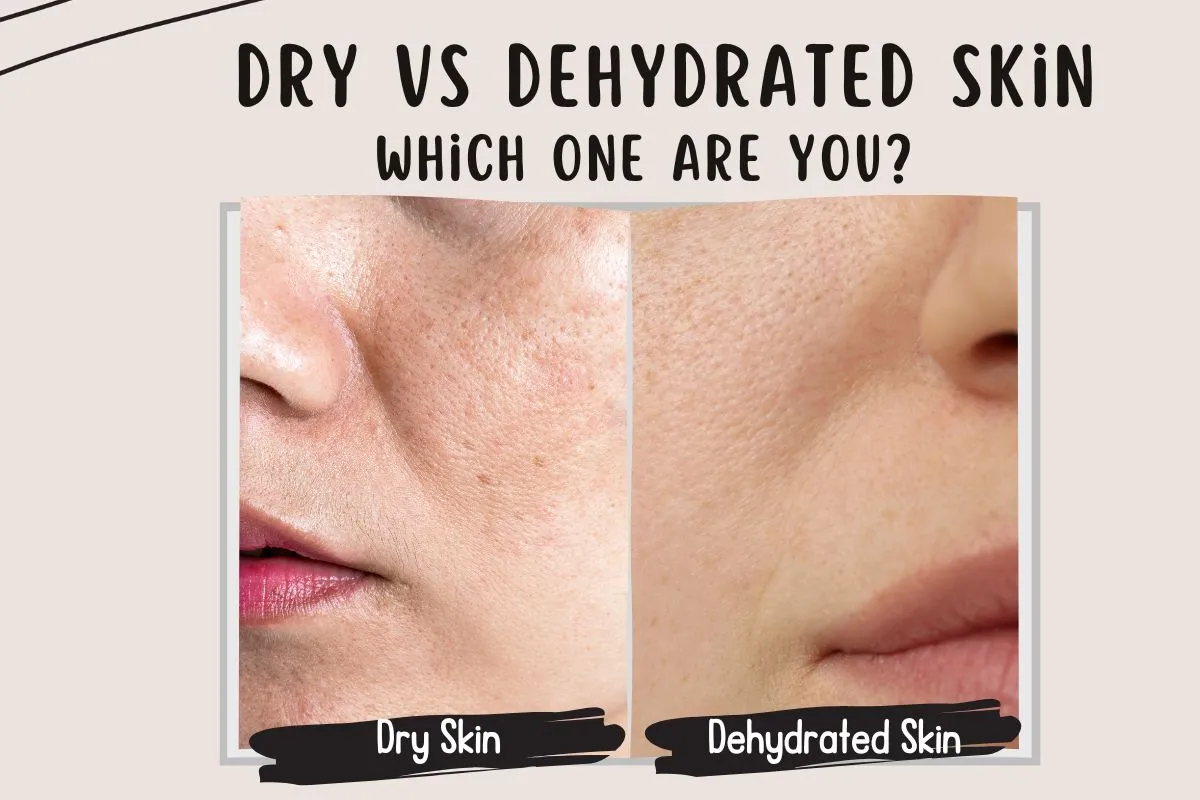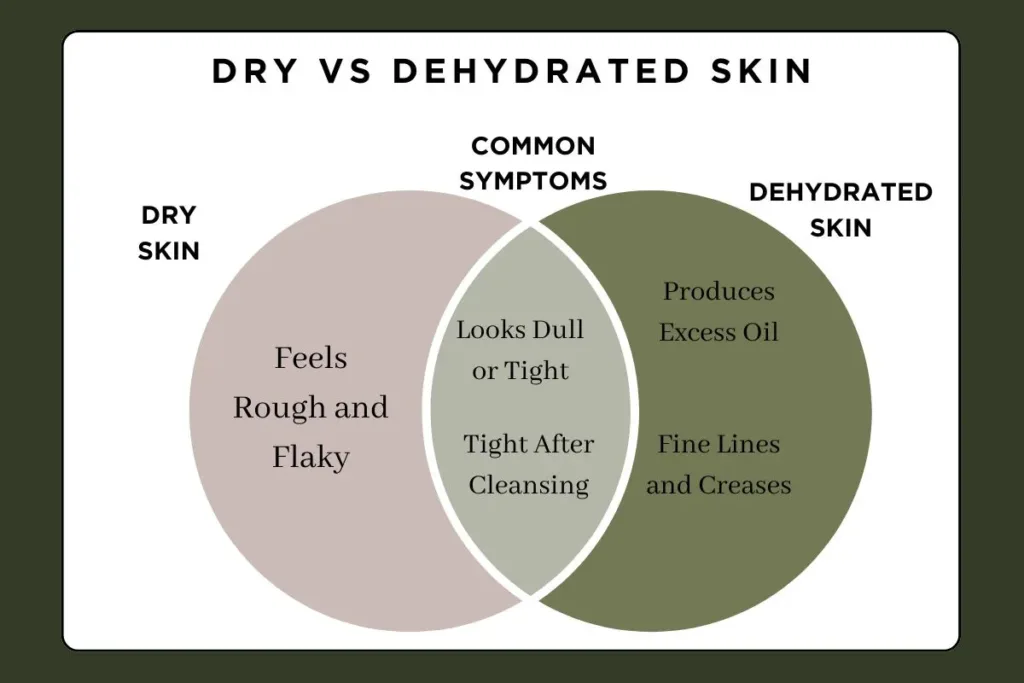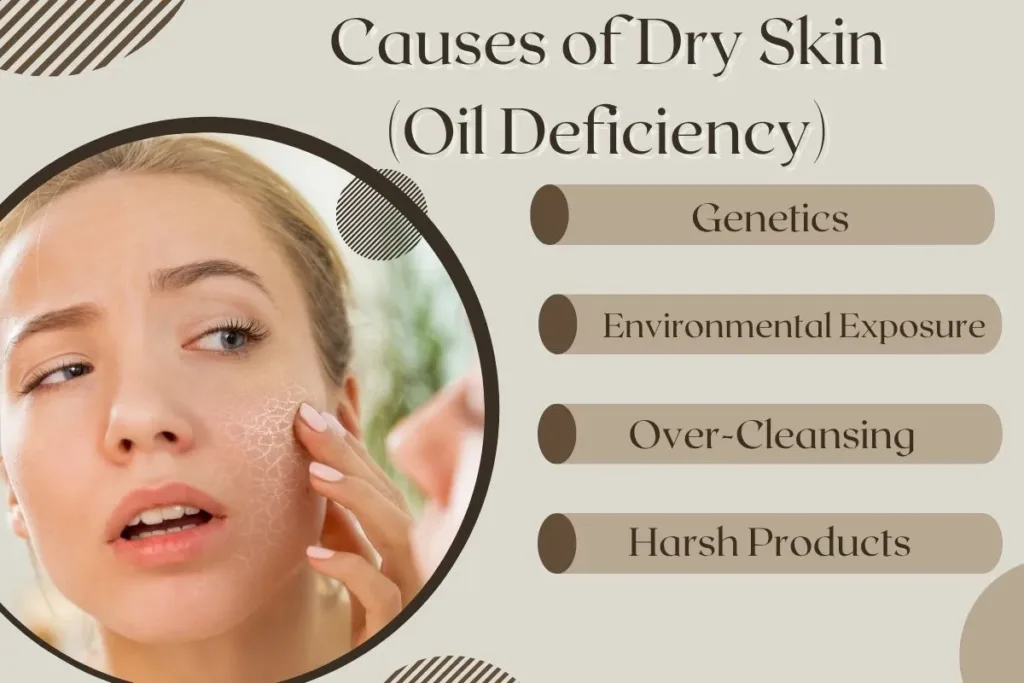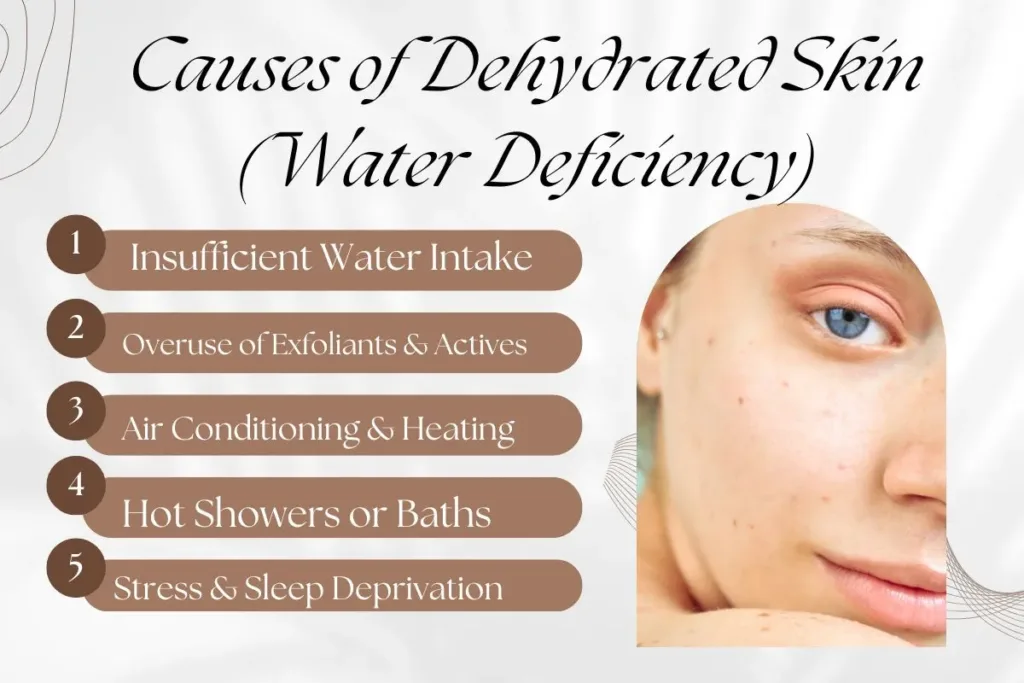No products in the cart.

Have you ever felt like your skin is tight, flaky, or rough despite slathering on moisturizer? You’re not alone. Many people confuse between dry vs dehydrated skin, and while they may seem similar, their causes and solutions are entirely different. Understanding the true nature of your skin condition is the first step toward achieving a healthy, glowing complexion. Whether your skin is lacking water or oil, recognizing the right issue can help you choose the most effective remedies especially when turning to the healing powers of herbs and natural ingredients.
But here’s the twist: even oily or combination skin can be dehydrated. Surprised? That’s because dehydration skin isn’t a skin type, it’s a condition, and it can sneak up on anyone. In this blog, we’re diving deep into the difference between dehydrated skin and dry skin, how to identify them, and the best herbal solutions to restore balance. You’ll also discover how hydrated vs dehydrated skin truly feels and why switching to botanical care might be the transformation your skin has been waiting for.
Dry vs Dehydrated Skin – What’s the Real Difference?
When it comes to achieving healthy, radiant skin, understanding the difference between dehydrated skin and dry skin is crucial but it’s often misunderstood. Many people mistakenly treat one as the other, which can worsen the issue over time. Although the terms dry skin and dehydrated skin are often used interchangeably, they refer to very different skin concerns with distinct root causes and treatment paths.
Dry Skin: A Lack of Oil (Sebum)
Dry skin is a skin type, which means it’s a more permanent condition, often determined by your genetics. It’s characterized by a lack of natural oils or lipids that keep the skin barrier soft and protected. People with dry skin tend to experience rough texture, flakiness, and even cracking especially in colder months. Dry skin can feel tight all day long and may also appear dull or ashy. Fine lines and irritation are more common when the protective oil barrier is insufficient.
Typical characteristics of dry skin:
- Feels tight and rough throughout the day
- Appears flaky or scaly, especially around the cheeks and forehead
- Experiences redness or irritation due to a weakened skin barrier
- May crack or peel in extreme weather
- Sebum production is minimal, so skin often looks matte
Since dry skin is an oil deficiency, it requires emollient-rich care, think herbal oils like jojoba or rosehip, butters like shea, and barrier-repairing ingredients like calendula or chamomile.
Dehydrated Skin: A Lack of Water
Dehydrated skin, in contrast, is not a skin type but a temporary skin condition that results from water loss or insufficient water content in the skin cells. The confusing part? Your skin can be dehydrated and oily at the same time. That’s because dehydration doesn’t affect oil production in fact, skin may overcompensate for the lack of water by producing more sebum, leading to breakouts, enlarged pores, and shine.
Common signs of dehydrated skin:
- Feels tight (especially after cleansing) but looks oily
- Skin may feel itchy, sensitive, or uncomfortable
- Looks dull, and fine lines become more pronounced
- May experience congestion or breakouts, especially on the forehead or chin
- Often shows signs of fatigue or lack of bounce (poor elasticity)
Unlike dry skin, dehydrated skin needs hydration not oils. That means ingredients that draw water into the skin (like aloe vera, glycerin, cucumber extract, or rose water) work best. Pairing these with a light occlusive (like squalane or jojoba oil) can lock in moisture without clogging pores.
How to Know If You Have Dehydrated Skin vs Dry Skin?
Still unsure which one you’re dealing with? Here’s a quick cheat:
- Pinch Test: Gently pinch your cheek. If your skin doesn’t bounce back quickly or feels papery, you’re likely dehydrated.
- Post-Cleansing Feel: If your skin feels tight right after washing but regains softness later, it could be dehydration skin.
- Shine + Tightness Combo: If you’re oily but still feel tight and flaky, you likely have dehydrated skin masking as oily skin.
Both dry vs dehydrated skin can lead to similar discomfort but using the wrong products can worsen the condition. For example, heavy oils might clog pores on dehydrated skin, while water-based gels might not be enough for dry skin that lacks lipids.
Common Symptoms:

| Symptom | Dry Skin | Dehydrated Skin |
| Feels rough and flaky | ✔️ Yes | ❌ Not typical |
| Looks dull or tight | ✔️ Yes | ✔️ Yes |
| Produces excess oil | ❌ Rare | ✔️ Sometimes |
| Tight after cleansing | ✔️ Often | ✔️ Often |
| Fine lines & creases | ❌ Mild | ✔️ Due to water loss |
Understanding the difference between dehydrated skin and dry skin helps you choose targeted skincare strategies rather than relying on guesswork.
The Root Cause: Why Does Your Skin Dry Out or Dehydrate?
Understanding why your skin is behaving the way it does is essential for choosing the right herbal remedies and skincare strategy. Many people misdiagnose their dehydrated skin as dry skin, or vice versa, leading to incorrect product choices and a cycle of irritation, dullness, and breakouts. While both conditions can make your skin feel tight, uncomfortable, and sensitive, the underlying causes of dry vs dehydrated skin are very different and so are their solutions.
Let’s explore the distinct root causes of each and why recognizing the difference between dehydrated skin and dry skin can help you transform your skincare routine from frustrating to flawless.
Causes of Dry Skin (Oil Deficiency)

Dry skin is caused by a lack of oil (sebum) your skin’s natural lubricant. This condition is typically inherited or part of your biological makeup, meaning it tends to be permanent unless managed with consistent care. Unlike dehydration skin, which can come and go, dry skin is a long-term skin type.
Main triggers for dry skin include:
- Genetics: If your parents have dry skin, chances are you do too. Some people naturally produce less oil, especially those with fair skin tones or certain ethnic backgrounds.
- Environmental Exposure: Cold, windy climates and low humidity strip the skin of its natural oils. That’s why your skin often feels flakier during winter.
- Over-Cleansing: Using soaps or cleansers too frequently especially those with sulfates or alcohol can strip away essential lipids from your skin barrier.
- Harsh Products: Alcohol-based toners, retinoids, and acne treatments without balancing hydration can dry out your skin significantly.
- Aging: As we age, sebum production decreases, making mature skin more susceptible to dryness, fine lines, and a weakened barrier.
Causes of Dehydrated Skin (Water Deficiency)

Dehydrated skin, on the other hand, is caused by a lack of water in the skin’s upper layers. It’s a condition, not a skin type, which means it can affect anyone, regardless of whether they have oily, dry, or combination skin. Unlike dry skin, dehydration skin is often temporary and reversible with the right care.
Main triggers for dehydrated skin include:
- Insufficient Water Intake: If you’re not drinking enough fluids, your skin may not receive the hydration it needs from within, leading to tightness, dullness, and increased sensitivity.
- Overuse of Exfoliants & Actives: Using too many products containing acids, retinol, or harsh scrubs can compromise your skin barrier and reduce its ability to retain water.
- Air Conditioning & Heating: Both indoor heating systems and AC units dry out the air, pulling moisture from your skin and worsening hydrated vs dehydrated skin imbalances.
- Hot Showers or Baths: While relaxing, frequent exposure to hot water can strip your skin’s outer layer of water and natural oils, causing dehydration skin to set in.
- Stress & Sleep Deprivation: Emotional and physical stress impacts hydration levels in your body and skin. Lack of sleep also decreases your skin’s ability to repair and retain water.
Best Herbal Solutions for Dry vs Dehydrated Skin
Let’s look at plant-powered remedies to tackle each condition with precision.
1. Aloe Vera – The Hydration Hero
Great for dehydrated skin, aloe vera is a humectant that binds moisture to the skin. Rich in polysaccharides, it also soothes inflammation and redness.
How to Use: Apply pure aloe gel daily before moisturizer.
2. Rose Water – pH Balancer & Hydrator
An excellent herbal toner for dehydrating skin, rose water helps tighten pores and calm irritated skin.
How to Use: Use it as a mist post-cleansing or mix with glycerin for added hydration.
3. Chamomile – Anti-Inflammatory Elixir
Especially useful for dry skin that’s itchy or inflamed, chamomile calms irritation and promotes healing.
How to Use: Brew chamomile tea, let cool, and use it as a face rinse or compress.
4. Calendula – Skin Barrier Booster
Calendula is rich in flavonoids that protect the skin barrier great for dry skin prone to cracking.
How to Use: Infuse calendula in oil and apply as a nourishing face oil at night.
5. Cucumber – Natural Hydrator
This water-rich herb is ideal for dehydrated skin, delivering moisture and vitamins without oiliness.
How to Use: Blend cucumber juice and apply it as a 10-minute mask.
6. Jojoba Oil – Sebum Mimic
Perfect for dry skin, jojoba oil mimics your skin’s natural oils and helps lock in moisture.
How to Use: Massage 2–3 drops onto damp skin after serum.
Daily Herbal Skincare Routine: Step-by-Step Guide
| Step | Dehydrated Skin | Dry Skin |
| 1 | Cleanse with aloe-based cleanser | Use creamy calendula cleanser |
| 2 | Rose water or cucumber toner | Chamomile or rose hydrosol toner |
| 3 | Aloe vera gel | Calendula + chamomile serum |
| 4 | Light herbal moisturizer (with hyaluronic acid) | Heavy herbal cream (with shea + jojoba) |
| 5 | Facial mist (cucumber or rose) | Herbal facial oil (jojoba, almond, etc.) |
Using this customized herbal ritual daily can help balance the hydrated vs dehydrated skin divide, no matter your skin type.
Lifestyle & Diet Tips for Long-Term Skin Hydration
- Drink 8–10 glasses of water daily.
- Add hydrating fruits like watermelon, oranges, and cucumber.
- Avoid hot showers and harsh soaps.
- Use a humidifier in dry climates.
- Manage stress with herbal teas like chamomile or tulsi.
Remember, dehydrated skin vs dry skin needs tailored care. What works for one can worsen the other.
Final Thoughts
Understanding the difference between dehydrated skin and dry skin empowers you to care for your complexion with precision. By embracing nature’s gifts like aloe vera, calendula, and rose water you can nourish your skin from the inside out. Whether you’re battling dehydrated skin or simply need a deeper moisture barrier, the herbal path leads to healing, hydration, and harmony.
Ready to transform your skin naturally?
Explore Hudira’s herbal skincare solutions today and rediscover what hydrated, healthy skin truly feels like.
FAQs
Q: Can I have oily but dehydrated skin?
Yes! Oily skin can still lack water, resulting in a tight, shiny complexion.
Q: How do I test for dehydration skin
Try the “pinch test.” Gently pinch your cheek if it doesn’t bounce back quickly, it may be dehydrated.
Q: Can I use the same product for both skin types?
Some hydrating products like aloe vera or rose water work for both, but dry skin often needs added oils.
Q: How long does it take to fix dehydrated skin?
With the right routine and hydration, most people see results in 1–2 weeks.
Q: Are Hudira products suitable for both types?
Yes! Our herbal skincare range includes solutions designed for both dry skin and dehydration skin, crafted with nature’s finest.



Add comment